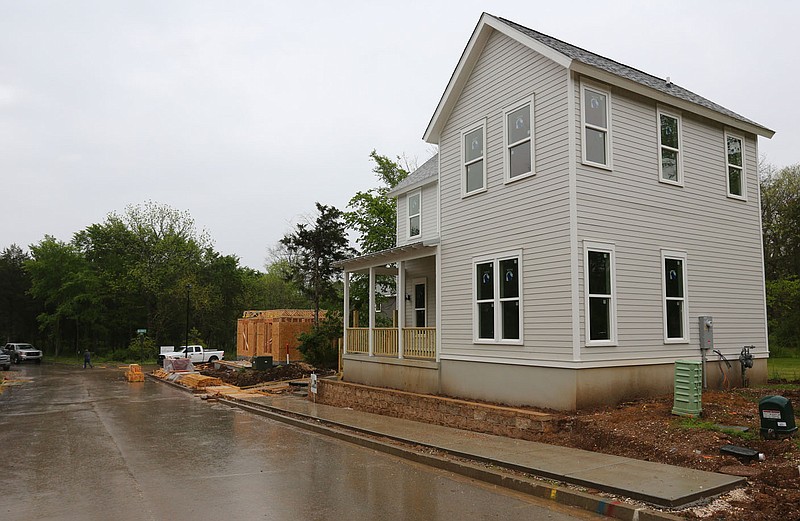FAYETTEVILLE — The nonprofit group behind a mixed-income neighborhood on the south part of town received a grant to hire staff members and expand its model regionally.
The Walton Family Foundation awarded Partners for Better Housing a nearly $2 million grant, according to a Tuesday news release. The grant will pay for three full-time employees and two part-time positions, with enough left over to hire consultants in planning, financing and research for three years.
Partners has operated largely as a volunteer operation since its founding in 2007 as an offshoot of the Fayetteville Housing Authority. A $50,000 donation from Iberiabank early last year helped pay for a part-time executive director, and the volunteer board hired Tiffany Hudson.
Hudson’s position now will become full-time with the grant. Partners also will hire a full-time real estate director and a stewardship manager who will work directly with homeowners at its Willow Bend neighborhood.
Keaton Smith, board member, said the Willow Bend project has proven to be an ambitious one for a volunteer board to take on. Smith and Hudson gave an online presentation to the City Council on Tuesday.
“If we had to do it all over again, I think we would have ensured the organization had staff capacity on the front end,” Smith said. “It’s one of the many reasons we’re really grateful to have that new staff capacity in the near term.”
Hudson said the organization hopes to start making hires in the coming weeks. So far, six Willow Bend homes are under construction, with four nearly finished. Three are under contract to close by the end of the month, with prices ranging $230,000 to $300,000.
Willow Bend is planned as an 80-home neighborhood on 9 acres east of Washington Avenue near Ninth Street.
All of the homes will be sold at market rate, but special financing will be available for 27 of the homes to people who make below 80% median family income for the Fayetteville-Springdale-Rogers metropolitan area. The financing is made possible through a shared equity program called Pay It Forward.
Median income for a family of four in Northwest Arkansas is $73,600, according to the U.S. Department of Housing and Urban Development. Eighty percent of that is $58,900.
Those who qualify for the Pay It Forward program will be eligible for $35,000 in down-payment assistance that will function like an interest-free loan. The assistance will lower monthly payments.
In turn, the buyer will agree to pay the $35,000 back upon resale or within 30 years. Partners for Better Housing will reserve the first right of refusal if a home is to be sold. Home-value appreciation will be capped at 2% annually to ensure affordability for the next buyer.
Another 27 of the homes will be reserved for buyers earning 80%-100% median income. The final 26 homes will be sold to buyers of any income level. All buyers will use traditional mortgage financing options, and owner-occupancy is required.
The Willow Bend neighborhood has an estimated total construction cost of $22 million and is being built about a handful of homes at a time primarily through loans. In 2016, the City Council agreed to invest $1 million to cover infrastructure costs such as streets, drainage and water and sewer lines. The goal is to finish construction in about three years.
The Walton Family Foundation grant means Partners for Better Housing can expand its Willow Bend model to neighborhoods in other Northwest Arkansas cities, Hudson said. The model could work with a new neighborhood that Partners develops, or the organization could partner with another developer interested in making the Pay It Forward program available to prospective homeowners, she said.
The Northwest Arkansas Council in March announced creation of its workforce housing center with backing from the Walton Family Foundation. The center will collaborate with organizations and nonprofit groups such as Partners for Better Housing, cities and developers to tackle the region’s housing needs and set priorities.
Meredith Bergstrom, program officer with the foundation, said the region has several organizations, developers and municipalities dedicated to solving affordable housing. But they need help achieving the goal, she said.
“Partners for Better Housing, for a number of reasons, is uniquely positioned to focus on developing equitable housing solutions for Northwest Arkansas,” Bergstrom said. “We hope this gives them the ramp-up to do that more quickly, to expand some of the solutions they’ve already developed that are really innovative and to continue to work on these really important issues.”
The 2019 Our Housing Future study from the foundation projects 80,000 households collectively will move to Fayetteville, Springdale, Rogers and Bentonville by 2040. The region needs to build about 2,900 units per year to keep up, but the four cities averaged 1,400 units annually from 2010 to 2016, according to the study.
The report recommends about half of the housing units must be appropriate for workforce households, defined as a family of four earning less than $78,000 a year.
The latest Arvest Bank Skyline Report published this month from the University of Arkansas Center for Business and Economic Research showed record home sales prices in Washington and Benton counties along with a low inventory of homes on the market.
The cost of purchasing a home increased 11% last year, averaging $293,403 in Benton County and $268,987 in Washington County.
Council Member Matthew Petty said he was glad to see the city could play some role in extending the model for Willow Bend to other parts of the region. He commended the volunteers who helped keep Partners for Better Housing going early on, making the organization’s expanded efforts possible today.
“I think we’ve only begun to see the impact of Partners’ work,” Petty said.
Stacy Ryburn can be reached by email at [email protected] or on Twitter @stacyryburn.

